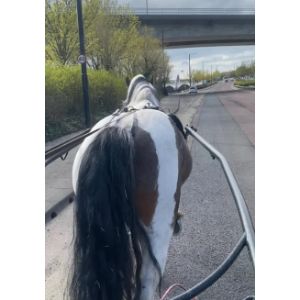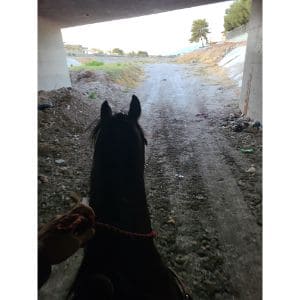There are many modes of transportation that we come across in our daily lives en route to different places which begs the question, can you ride a horse on the road?
One of these modes of transportation that has been used by humans for centuries is the horse. But can you ride a horse on the road?
Technically, you can ride a horse on the road, as there are no laws that prohibit one from doing so.
However, it’s still best to check with your local laws just in case there are any specific restrictions regarding horseback riding on the road.
Keep reading below for more information.
Before you scroll further down this guide, check out these other horse-related articles: Best Horse Rescues in Wisconsin and Does A Horse Eat Meat?.
Is It Legal to Ride Horses on the Road?

Riding your horse on the road is legal only if you follow the rules and restrictions set forth by your state, county, and city.
You can ride your horse down city streets without violating any federal restrictions, but you should still check with the local authorities to make sure.
Can I Ride a Horse on All Roads?

Never ride or walk your horse on a paved road, and never lead your horse on a path designed for pedestrians or cyclists. Riding a horse on a highway is illegal.
When possible, a bridleway should be used. If you come across equestrian crossings that allow horse riders to safely cross the road, then use them.
These intersections are larger, more clearly marked, and equipped with pavement barriers and illuminated horse-and-rider figurines.
The controls are designed for equestrians and come in the form of either a pair of controls, with one set located higher, or a single control located higher.
When you approach level crossings that are accompanied by a sign that reads “horse rider dismount,” you are required to dismount your horse.
Laws for Horses as Vehicles vs. Horses as Livestock

Horses are treated as livestock by most laws; this includes regulations on their care and management, slaughtering restrictions, legal responsibility in the event of an accident involving a horse, and so on.
Horses that are ridden or driven as part of an “equine activity” or that are managed as a loose herd are subject to most of these restrictions.
Driving or riding a horse on a public road is subject to the same regulations as any other vehicle. They are considered motor vehicles under the law because they are required to share the road with cars.
It is generally permissible to ride your horse on the road unless specifically prohibited by local law, and specific laws can differ from region to region.
As “slow-moving vehicles,” carriages and sleighs pulled by horses are also subject to the same regulations as other motor vehicles.
There are, however, several notable exemptions for carriages, most frequently in tourist-related contexts.
Are Horse Riding Road Accidents Common?

While most people can legally drive their horse and buggy down the road to the local convenience store, doing so for business may require a special business license.
The BHS’s statistics on vehicle-horse accidents are very concerning. These numbers could be much more worrisome given that just one in ten cases is reported to BHS. From November 2010 to March 2019:
- There were 315 horse deaths and 43 human fatalities.
- There were 3,737 accidents reported.
- 73% of all incidents were caused by vehicles traveling too closely.
- 31% of incidents were due to vehicles passing at an unsafe speed.
- Some 32% of riders have reported being the target of abuse or road rage.
- It is quite evident that this issue will not be gone anytime soon: between the 1st of March 2018 and the 28th of February 2019, the BHS received reports of 845 incidents.
- Almost a third of riders said they have been the target of harassment or violence while out on the road.
Keep these numbers in mind whenever you take your horse out on the road, because not all motorists will behave safely.
In the same vein, it is your responsibility to ride in compliance with the law whenever you are on the road.
This includes familiarizing yourself with the Highway Code, ensuring that you have the appropriate equipment, and acting under the laws at all times.
It’s safe to say that horses are ‘flight’ animals. This makes them vulnerable to being frightened and causes them to act erratically.
Even the most skilled rider will have problems keeping a horse under control if it is startled by a fast-moving car. When confronted with a frightening scenario, horses will naturally try to flee the area as quickly as they can.
When and Where Riding is Prohibited

Even though there are very few laws that prohibit riding on the road, you should nevertheless pay attention to the local regulations. This is by no means an all-inclusive list. A few examples of traffic legislation are listed below:
- Do not secure your horse to a tree along a state roadway in Louisiana by tying it to the trunk or allowing it to stand in a manner that could put the tree at risk. Riding is likewise not allowed on highways that have been paved.
- Alabama law states that you are not allowed to tie your horse or any other livestock animal to the right-of-way of a highway.
- You are not allowed to go any faster than a walk when you are on bridges in the states of Idaho, Mississippi, and Pennsylvania. (As a fun fact, a violation of a statute enacted in Mississippi in 1857 carries a fine of only $5 unless a warning sign is present, in which case the fine is not enforced.)
- The state of Nevada prohibits “reckless” riding.
- The states of Pennsylvania and New York have banned highway racing.
- Do not ride your horse on a levee in the state of Kentucky.
Although equestrians are not explicitly prohibited from using state highways by constitutional provision, they must still obey all traffic laws and regulations.
For your own and other drivers’ safety, you should always follow the rules of the road when out on your horse.
When possible, use equestrian crossings and refrain from riding on pavements or other areas specifically reserved for foot traffic.
Road Safety Tips for Horse Riders

Take all necessary care when sharing the road with motor vehicles, even if you have the right to be there. You can find a few helpful tips below:
- Keep on designated paths such as trails and bridleways and stay off the highways if at all possible. It’s safer for you and your horse, and trails and bridle paths are usually built with equestrians in mind.
- Do your homework. If you must travel on roads, pick one that has few vehicles passing through it, broad shoulders, and no blind corners, if possible.
- Dress in highly visible, reflective apparel. Bring out your most dazzling attire right now. It’s easier to avoid a collision if drivers can immediately spot you.
- Invest some time in training your horse so that he is prepared for your journey. You should desensitize your horse to roadside sights and sounds and train them to deal with being startled without throwing you off the back of the horse and into traffic if you intend to ride on highways frequently.
- Try to travel in pairs, and don’t forget your helmets.
Things to Consider When Riding a Horse on the Road

You cannot be “pulled over” for riding your horse in a location where you are within your rights to do so, nor can you be issued a ticket for speeding or running a red light, even if your horse is required to comply with traffic regulations.
If you ride your horse irresponsibly or violate any laws, you will still face punishment.
Riding a Horse Under the Influence
You shouldn’t get behind the wheel after drinking; drunken riding is a serious offense.
Most states prohibit drivers under the influence of alcohol or drugs from operating a motor vehicle, which may or may not include riding a horse.
People have been arrested and convicted for being drunk while riding horses in various states.
These states include California, Texas, and Florida. They were convicted of lesser offenses, such as public intoxication, in states where it is not against the law to ride a horse after drinking.
Riding a Horse While Texting

In today’s technologically advanced culture, texting or talking on the phone while riding would most likely be against the law (though this may vary widely from state to state).
In general, if it’s against the law for motorists to do so, it’s also against the law for equestrians to do so.
Other Legal Consequences
Even if you cannot be prosecuted for driving under the influence of alcohol or drugs (DUI/DWI), you should still avoid doing anything that puts the safety of either you or your horse in jeopardy.
Damage to another person’s property or car may be your responsibility in the event of an accident.
If you are discovered riding your horse while intoxicated, you could face charges of animal endangerment, public endangerment, and public intoxication.
How to Share the Road with a Horse

Following are some tips for driving near horses that other vehicle users must follow:
- They must exercise extreme caution when passing a horse-drawn carriage or rider. They need to move cautiously, leaving enough room between the horse and the car.
- They must keep an eye out for signals from horse drivers and riders and obey any instructions to slow down or stop.
- They must reduce the speed significantly and get ready to stop completely; the BHS suggests no more than 15 miles per hour. Once the rider and horse are out of harm’s way, gradually pick up the pace.
- They must keep at least the width of a car’s doorway between the two.
- They must not do anything that could startle your horse, including honking a horn, revving an engine, or splashing through puddles.
Conclusion For “Can You Ride A Horse On The Road”

Now that you know about the technicalities of riding a horse on the road, you can hit the road on your horse’s back with ease of mind.
But do remember that riding a horse requires some extra safety precautions since you will be sharing the road with other vehicles.
If you find this guide, “Can You Ride A Horse On The Road,” informative and helpful, you can check out these other horse-related articles from our team:
You can learn more about horses by watching “10 Quirky Facts You Didn’t Know About Horses” down below:




